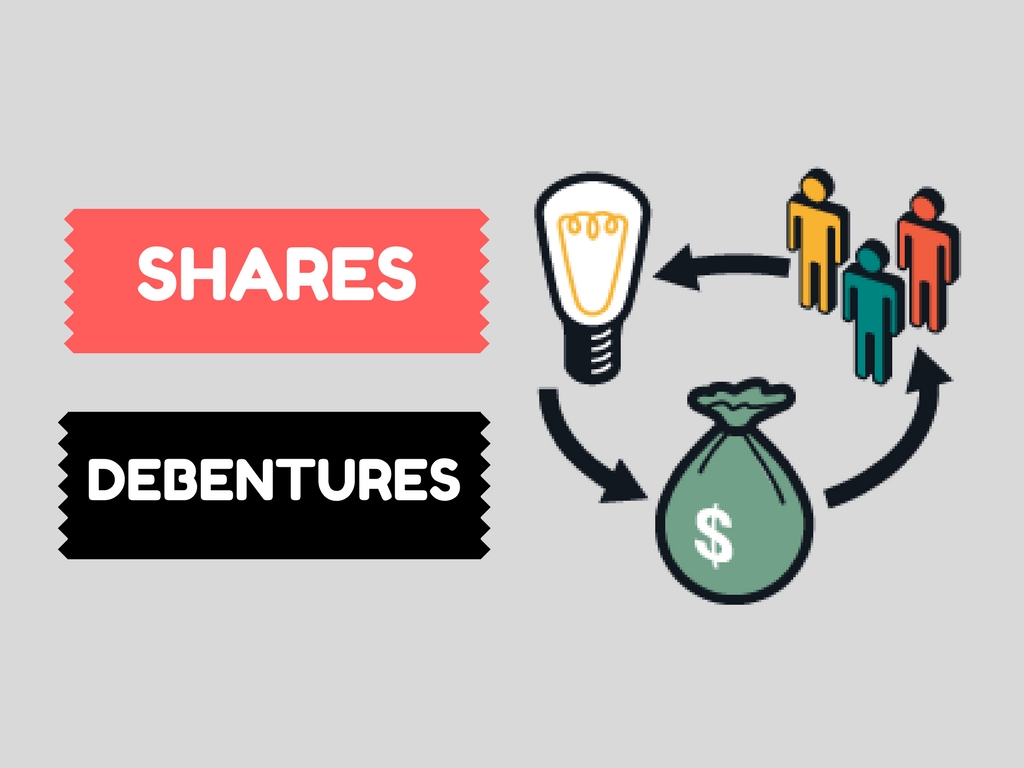Every business requires capital for starting a business. For starting a large scale organization there is a need for huge amounts of capital. For raising a capital company uses various sources of funds like share capital by issuing shares to public, debt capital by issuing debentures, term loans from banks, etc.
Out of all sources of funds, companies prefer shares and debentures more. People who are interested in investing in shares and debentures are increasing every day showing a rapid growth in the capital market. The more people invest in companies more capital companies rise which leads to overall economic growth. There are many differences between Shares and Debentures, they are as follows.
SHARES
The share of a company can be defined as a small part of the capital. The total capital which is required by the company is divided into units of equal value, These units are called as ‘Shares’, the individuals who purchase or holds the shares of the company are called as ‘Shareholders’ of the company. Every shareholder is issued a certificate of purchase of shares called as ‘Share Certificate’ which shows the details of the shares purchased by the individual.
The value of the share is called as ‘Share Price’ and the original value of the share which is written in the books of the company is called as “Par Value” or “Nominal Value” or “Face Value” of the share. Companies after getting profits retain some amount for future use and the remaining profit is distributed to shareholders in the form of “Dividend”. In other words, the returns which are obtained by investing in shares is called as “Dividend”.
TYPES OF SHARES
Shares are majorly divided into two types, they are
⦿ EQUITY SHARES: Equity shares are the shares which are irredeemable. The rate of dividend on equity shares is not fixed and vary according to the policies of the management of the company. Equity shareholders receive dividend only after the preference shareholders are paid dividends.
⦿ PREFERENCE SHARES: Shares which have a fixed rate of dividend and paid dividend before the equity shareholders are paid dividend. These type of shares have no voting rights in the management of the company.
DEBENTURES
A debenture is defined as the sum of money raised by the company in the form of borrowing. A company resort to the borrowing of money from different sources like commercial banks, finance institutions and also from the public. The individuals who hold debentures of a company are called as “Debenture Holders”. The document of Debenture is called as “Debenture Certificate” issued under the company seal contains terms and conditions regarding interest rate and repayment of capital.
Debenture holders are literally called as “Creditors” to the company. Debenture holders are paid irrespective of the company’s profits or loss. They don’t have any voting rights regarding the management of the company.
TYPES OF DEBENTURES
There are various types of debentures which are categorized according to their nature, They are as follows
⦿ Redeemable Debentures
⦿ Irredeemable Debentures
⦿ Naked Debentures
⦿ Bearer Debentures
⦿ Registered Debentures
⦿ Convertible Debentures
COMPARISON TABLE
| SHARES | DEBENTURES |
|---|---|
| Share capital forms a part of the total capital of the company and shareholders are treated as owners of the company. | Debentures are defined as a debt of the company and debenture holders are creditors to the company. |
| Rate of Return | |
| The dividend rate on shares fully depends upon the profits that are obtained by the company. | The interest rate on debentures is fixed at the beginning of the issue of the debentures. |
| Payment Condition | |
| Shareholders are paid after the debenture holders are paid interest. | Debenture holders are paid the interest before the shareholders are paid. |
| Payment Obligation | |
| Shareholders are paid dividend out of profits and if the company is in losses they don't get dividend. | Debenture holders are creditors and get interest compulsorily irrespective of the company makes a profit or not. |
| Winding up of Company | |
| The shareholders of the company may lose a part or full of their capital when the company is wound up. | The company should pay back the investment of debenture holders invariably when the company is wound up. |
| Voting Rights | |
| Shareholders are given right to attend and vote at the meetings of the shareholders conducted by the company. | Debenture holders do not have any right to vote in the company's meetings. |
| Risk Associated | |
| Investment in shares of the company is considered as risky because shareholders are of residual interest in the company. | Debentures are considered as a good investment idea because it has a right to get the investment amount back. |
| Redeemable Nature | |
| Shares are not redeemable except in the case of redeemable preference shares. | Debentures are redeemable after the completion of the maturity period. |
| Security | |
| The shareholders have no security for the investment they made on shares. | Debentures are very well secured because the debenture holders have a charge on assets of the company. |
| Maturity Period | |
| A shareholder of the Shares is not paid back by the company because shares have no maturity period. | Debenture holders have to be paid back at the end of a maturity period of the debenture. |
CONCLUSION
By the above discussion, it is evident that both shareholders and Debenture holders can be called investors of the company. Every company tries very hard to maximize the returns to shareholders and also to pay interest to debenture holders in time. By increasing the shareholder’s wealth company makes its shareholders loyal to the company for a lifetime.


